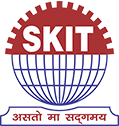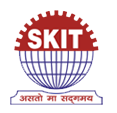Teaching Learning Methodology
Adherence to Academic Calendar
Step 1: Every year, the Director (Academics) prepares a draft for the upcoming academic calendar aided by the Academic Calendar prescribed by Rajasthan Technical University, Kota.
Step 2: Prior to finalization, the draft calendar is communicated to the Head of Departments, Examination Cell, Placement Office, and other stakeholders.
Step 3: The department academic calendar is then framed in accordance with the institute calendar by DPAQIC.
Step 4: Finally, the academic calendar is circulated among all students and faculties.
Use of various instructional methods and pedagogical initiatives
- Lecture: Primarily a method of delivering course content in the class is evolved and used for every course.
- ICT e-SLATE: The institute has developed three studios called “e-SLATE: Smart Learning and Teaching Environment” furnished with the latest ICT-enabled tools to generate quality e-content for each course. This content is shared with students through ERP.
- Collaborative Learning: Students process information and derive knowledge by discussing course-related issues and topics with each other in the form of Group Discussions. This practiced is adopted in labs and design classes.
- Cooperative Learning: Small groups of students work together to solve a problem or complete a task. This type of learning method is generally done in Project-based courses and Labs.
- Power-point presentations:Use of this widely accepted technique is done wherever deemed necessary in the department. This has become a standard norm in the teaching-learning process and is facilitated by the fact that all our classrooms are well-equipped with high-quality projectors ready for use at any time.
- Case Studies: This involves individuals or groups of students working together to analyze a practical case, a real-life situation that has been written up to highlight problems and solutions.
- Gyandan Resource Center (Central Library): Library contains a large number of reference books, text books of leading publishers in print as well as e-books and research journals. Reference material like University Papers from previous years, NPTEL Lectures and Videos, and other selected PPTs and Videos are available to students on the library server. These are being regularly updated. The Library also offers inter-library loan service to its users for books and periodicals & other reading materials not available in the institute library by procuring them from other libraries through DELNET (Developing Library Network). Many National and International Journals including Science Direct/Elsevier are available through E-Library.
- D-Space: Initializing from 2015-16, D-Space Server has been also established in the digital library. Students can readily access course material, notes, assignments, lab manuals, etc. frequently uploaded by faculties via their dedicated accounts.
- Brainstorming: Students of the second & third years discuss real-life case studies related to various civil engineering topics in the seminar class assigned beyond the curriculum. Assignments based on real-life problems are given to students and they provide the solutions for the same. Quick learners are motivated to participate in various competitions conducted by the Nirmaan club, BIS club, ICI student chapter, and other cells of the institute from time to time. Project class is scheduled for 2ndyear students in which through a critical thinking approach they make charts, models etc. to show various innovative approaches. ICI fest, Site visits and expert talks are arranged where students interact with professionals, which improves their thinking out of the box. Assignments are given to students on real-life problems, improving their ability to solve complex engineering problems and inculcate lifelong learning skills in them.
- 10. Club activity:Five clubs and chapters are currently being run by the Department of Civil Engineering i.e. ICI Students Chapter, IGBC Student Chapter, Nirman club, Civil Technical Form, BIS club: Various technical and non-technical activities in this clubs and chapter act as excellent grounds for innovative learning. In this clubs and chapters, the faculty are not the only disseminators of knowledge; senior students (older club members) pass on their knowledge and learning to the younger generation (new club entrants) via a continuous ritual-like process, which includes hands-on training, presentations, lectures, group discussions and many other innovative procedures. The clubs with their club activities literally act as the most fertile grounds for innovations in the teaching-learning process.
- MOOCS Courses:MOOCS or Massive open online courses are a relatively new entry in the academic sector throughout the world. Although the role of MOOCs in the effective dissemination of knowledge is still under debate, they are speedily gaining unquestioned acceptance in more and more academic circles as an innovative means of imparting additional knowledge to students. MOOCs support lifelong learning by providing opportunities for students to update their skills and knowledge throughout their careers. Here at SKIT, we support augmenting our own efforts of effective delivery by MOOCs available through agencies like NPTEL and SWAYAM since 2008.
- Adherence to Bloom’s taxonomy:The mid-term tests for all subjects in the department are made in strict adherence to Bloom’s taxonomy. This ensures that the learning, as well as the assessment mechanism, is based on standard practices of the academic fraternity worldwide.
Impact of Adopted Teaching-Learning Process
- Student Performance: The performance of students is improved in Internal and University examination. The number of students who have graduated in the stipulated period are increased: The numbers of graduate students were 101 out of 125 in batch 2017-21 and 113 out of 128 in batch 2018-22. The percentage of improvement of graduate students was almost 7%.
- Engagement in Classes: It is observed that students attendance in classroom is drastically enhanced in academic session 2022-23.
- Critical Thinking & Problem-Solving Skills: Significant improvement has been observed in the students which is evident by quality of their projects, participation in group discussion/
- curricular and extracurricular activities/ seminar presentation etc.
- Overall Effectiveness: Improvement have been noted in the performance such as GATE results, number of passout graduates, placement, presentation skills, participation and organization of various activities conducted by the department. Students are proactive in various clubs and chapters run by the department. Department of Civil Engineering has secure best ICI student Chapter award in the year 2019 & 2022.






